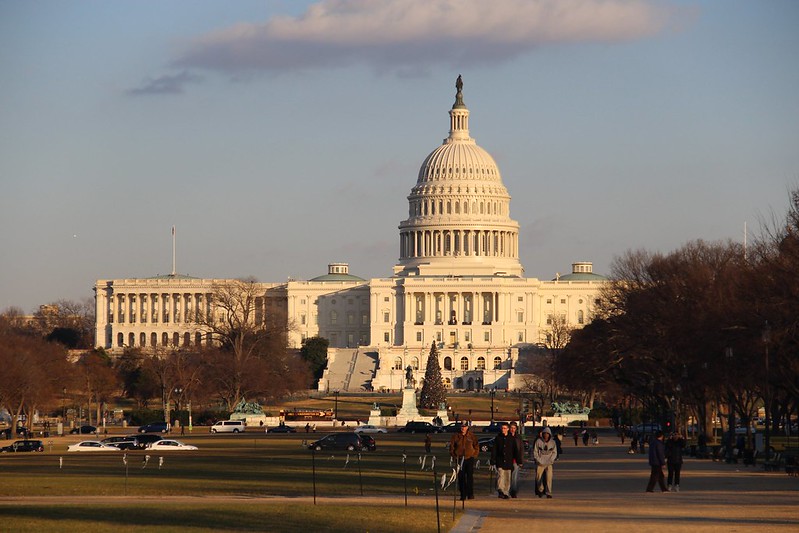 "US Capitol" by Sandwich is licensed under CC BY-NC-ND 2.0.
https://www.flickr.com/photos/sandwichgirl/12869677175/in/photolist-kBfsDM-GGfP-QsEWf2-7PzyK3-7h9LA1-7h9K6U-UXRn-7h5Poa-5MDDBE-8aDBqe-LxngR-ut59t-62CQL1-7h5NxD-6FZTXZ-7UuX4L-7h9KT7-7h9KoU-dMUy9X-eXyZrg-aLDCV-hDHdh-7u4KHf-oGSwUj-8RijBA-3f4xjP-2eU8Aq1-7ENN9
"US Capitol" by Sandwich is licensed under CC BY-NC-ND 2.0.
https://www.flickr.com/photos/sandwichgirl/12869677175/in/photolist-kBfsDM-GGfP-QsEWf2-7PzyK3-7h9LA1-7h9K6U-UXRn-7h5Poa-5MDDBE-8aDBqe-LxngR-ut59t-62CQL1-7h5NxD-6FZTXZ-7UuX4L-7h9KT7-7h9KoU-dMUy9X-eXyZrg-aLDCV-hDHdh-7u4KHf-oGSwUj-8RijBA-3f4xjP-2eU8Aq1-7ENN9
Democrat proposals to increase the tax rate for the Global Intangible Low-Taxed Income (GILTI) provision will make America less competitive, increase tax complexity for American businesses, and cost jobs and wages. These proposals would also give the U.S. higher taxes than the global agreement amongst foreign countries to set a foreign minimum tax rate of 15 percent.
What is GILTI?
GILTI was created by the Tax Cuts and Jobs Act of 2017 and was included in the bill as a tradeoff for other tax cuts including ending the double taxation of American businesses and reducing the corporate tax rate to 21 percent, a rate in line with the rest of the developed world.
GILTI establishes a minimum tax on foreign earnings of American businesses and was designed to discourage businesses from shipping profits overseas.
It is calculated by applying the corporate tax on net foreign income after a deduction of 10 percent on foreign tangible assets, or qualified business asset investment (QBAI). Businesses are allowed a 50 percent deduction on GILTI, resulting in an effective tax rate of 10.5 percent. Foreign tax credits can also be taken against GILTI equal to 80 percent of taxes paid, in which case taxpayers pay a 13.125 percent rate. Starting 2025, the GILTI rates increase from 10.5 percent to 13.125 percent and 13.125 percent to 16.4 percent.
What have Democrats proposed?
President Biden proposed significantly increasing GILTI in his fiscal year 2022 budget proposal. Biden’s plan calls for:
- Increasing the rate from 10.5 percent to 21 percent, which after the disallowance of foreign tax credits would provide a top rate of 26.25 percent.
- Eliminating the deduction against taxable income for a 10 percent rate of return on tangible assets.
- Assessing GILTI on a country-by-country basis, rather than a worldwide basis, a proposal that would create significant tax complexity for businesses.
House Democrats have proposed a similar tax increase in their $3.5 trillion reconciliation proposal:
- Increasing the GILTI rate to 16.5 percent.
- Reduce the deduction for Qualified Business Asset Investment (QBAI) to 5 percent.
- Assess GILTI on a country-by-country basis.
- Reduce the Foreign Tax Credit to 5 percent.
Senators Ron Wyden (D-Ore.), Sherrod Brown (D-Ohio) and Mark Warner (D-Va.) have also proposed changes to GILTI in a discussion draft released in August. While they have not set a rate for GILTI, they propose shrinking the 50 percent deduction, which would raise the top rate. They also propose repealing the QBAI deduction and applying GILTI on a country-by-country basis for low-tax income.
Any of these proposals would make the U.S. less competitive. In addition to these tax increases, the Democrats want to significantly increase the corporate income tax. Biden has proposed raising the corporate tax rate to 28 percent (32 percent after state taxes), while House Democrats want to raise it to 26.5 percent (31 percent after state taxes). Either rate would be higher than foreign competitors such as China, which has a 25 percent rate, or Europe, which has an average rate of 21.7 percent.
How would this impact the US economy?
Biden’s proposed changes to GILTI would lead to a $340 billion tax hike over the next decade, could eliminate one million jobs and cause $20 billion in lost economic activity, according to a recent EY report published by the National Association of Manufacturers.
As the report explains, Biden’s proposed GILTI tax increase could result in anywhere from a 200,000 to 3.1 million loss in jobs. The report estimates the most likely employment loss is approximately 1,000,000 lost jobs. Additionally, the changes would cause a decline in investment ranging between $10 billion and $20 billion. This is because the tax hike increases the cost of capital, making investing less profitable.
The report also notes the following:
- U.S. Multination Corporation (MNC) domestic employment is estimated to decline by between 0.6% and 10.9%
- U.S. MNC domestic compensation is estimated to decline by between 2.2% and 10.4%
- U.S. MNC domestic investment is estimated to decline by between 1.1% and 7.3%
EY also studied the impacts of the proposed changes to GILTI provision on economic activity in Texas. This study was commissioned by the Texas Association of Business by EY and the Bureau of Business Research at the University of Texas at Austin.
In Texas, EY assessed that the most plausible employment effects of GILTI tax hikes for U.S. multinational corporations range between 16,000 and 33,000 lost jobs with a high-end estimate of 100,000 potential lost jobs. These changes could reduce gross state product (GSP) by up to $14.5 billion.
Both President Biden’s and congressional Democrats’ proposed changes to the GILTI tax would hurt workers, the economy, and make U.S. businesses less capable of competing with foreign competitors. It would also undermine the TCJA’s territorial system and moves the U.S. once again towards a worldwide system of taxation. These proposals should be rejected.

